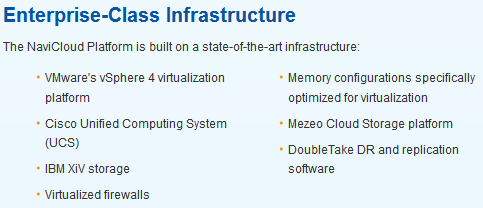Another Open Letter to Co-Lo Data Center Operators
 Monday, April 2, 2012 at 8:00AM
Monday, April 2, 2012 at 8:00AM In this guest post, Matt Ferm shares more insights for co-lo operators:
On February 6th Gary Kelley, posted an article titled “An Open Letter to Co-Lo Data Center Operators.” In the article he offered some do’s and don’ts during the RFP process. I would like to share some observations around what prospects are look for when evaluating a data center co-location provider.
As Gary mentioned, Harvard Partners performs a lot of co-lo RFPs, co-lo contract negotiations on behalf of clients, and migrations to co-location sites. We coach and mentor clients from the point they think they might want to migrate their data center to watching them become fully operational in a co-location site. During this process we see the reaction clients have to the sales pitch, value proposition, and site visit of many co-lo operators.
Here are some observations:
- You are not special – we know every co-lo operator is special and you are all better than your competition. After two site visits (and two data center tours) our clients turn to us and say “it feels like we have done this before.” As this is what you are selling, you must do the data center tour, but please recognize it can be mind-numbing to see one data center after another. Keep the tour brief and focus on what will interest the prospect.
- Listen to the customer – the customer has selected to visit because they are trying to solve a specific problem. Maybe it’s a construction project impacting their data center or frequent outages. Maybe they want to instill more discipline in their data center operations. In any case, it is important for you to understand who you are talking to and why they are seeking co-location. Don’t compare the prospective customer to organizations they can’t relate to. Using an example of a very large company when talking to a medium-sized prospect can become insulting as it makes the prospect feel much less important.
- Don’t oversell - most customers are coming from a server room or a Tier 1 data center. Maybe they have a generator and maybe they have some extra cooling. The likelihood is their “data center” is a converted room in a commercial office building. You are about to show them something so far beyond their imagination they tend to get overwhelmed and ask “do I really need all this.”
- Details matter – customers come to you because they know you will pay attention to the details required to operate a state-of-the art data center. Don’t create doubt with such incidents as dirty floors, too many construction workers around production equipment, ceiling tiles with water stains, visible rodent traps, and propane grills anywhere near your generators. When the prospective customer comments “I wouldn’t let that happen in my data center” you know you’ve lost the deal.
- Make it real – whatever you sell make sure the prospective customer can translate it into dollars. Every co-lo operator talks about managed services and cloud in one slide and then goes back to talking about generators, cross-connect rooms, and cooling towers. If you are going to talk about extra services then make them real through a demonstration and consider bundling services into the co-lo contract. Every one of our clients has told us co-location is the first step to the cloud. We watched two CIOs “wake up” as a co-lo operator created a fully operational Windows Server instance in their cloud within 5 minutes. The same co-lo operator offered free “cloud migration services” which got a response of “so what” from the CIOs. When the offer changed to a free 4 CPU, 12 GB RAM, 100GB storage instance for a year, the CIOs immediately decided to go with that co-lo operator. The CIOs were able to dollarize the offer and place a value on it.
- Become a partner – customers are looking for you to demonstrate how you will make them better. Providing a resilient and robust data center is an important selling point, but so is your knowledge of process, managed services, technical architectures, cloud, and DR. We watched as technical teams between a co-lo operator and a customer started to have a “mind meld” over a network architecture. The CIO observed the interaction between the two teams and was convinced he had found a partner and made a decision to go with that co-lo operator.
- Be personable – Gary always reminds me “people buy from people.” In the co-lo space it is always true. You might think they are buying the generators, chillers, and multiple points of access into your facility, but what they are buying is you. The CIO is looking for the person they will trust with their career. Every CIO I meet when working on co-lo engagements tells me the co-lo decision is a make-or-break decision for their career. Very simply, if they can’t provide services to their users, then they had better start updating their resume.
- Price is important – once you accept you are not special then you realize co-location services are a commodity (sorry). Responding to an RFP with a low price gets the attention of CIOs. Most of the time, before we get called in by a CIO, they have already visited one or two co-location sites. They like what they see and are very excited, but realize they should do an RFP. When one of those co-lo operators comes back with something resembling “list price,” the CIOs go visit other co-lo operators and quickly realize the services they require are commodity.
- Bundle – when we do an RFP we always ask for a certain number of remote hands hours to cover things like tape rotation. You can differentiate yourself by offering these types of services as part of the base cost when the prospective customers visit you. It is something they remember.
 Two propane grills (and a picnic table) adjacent to the diesel generators (and belly tanks containing fuel.)
Two propane grills (and a picnic table) adjacent to the diesel generators (and belly tanks containing fuel.)
We believe the co-location market is changing. Just two years ago we were mostly concerned about customer expansion over the course of a 5-year contract. Today, we must think about contraction of space as customers think of going to managed services and the cloud. Your relationship with the customer and helping them grow are the key selling points as our industry moves forward.


